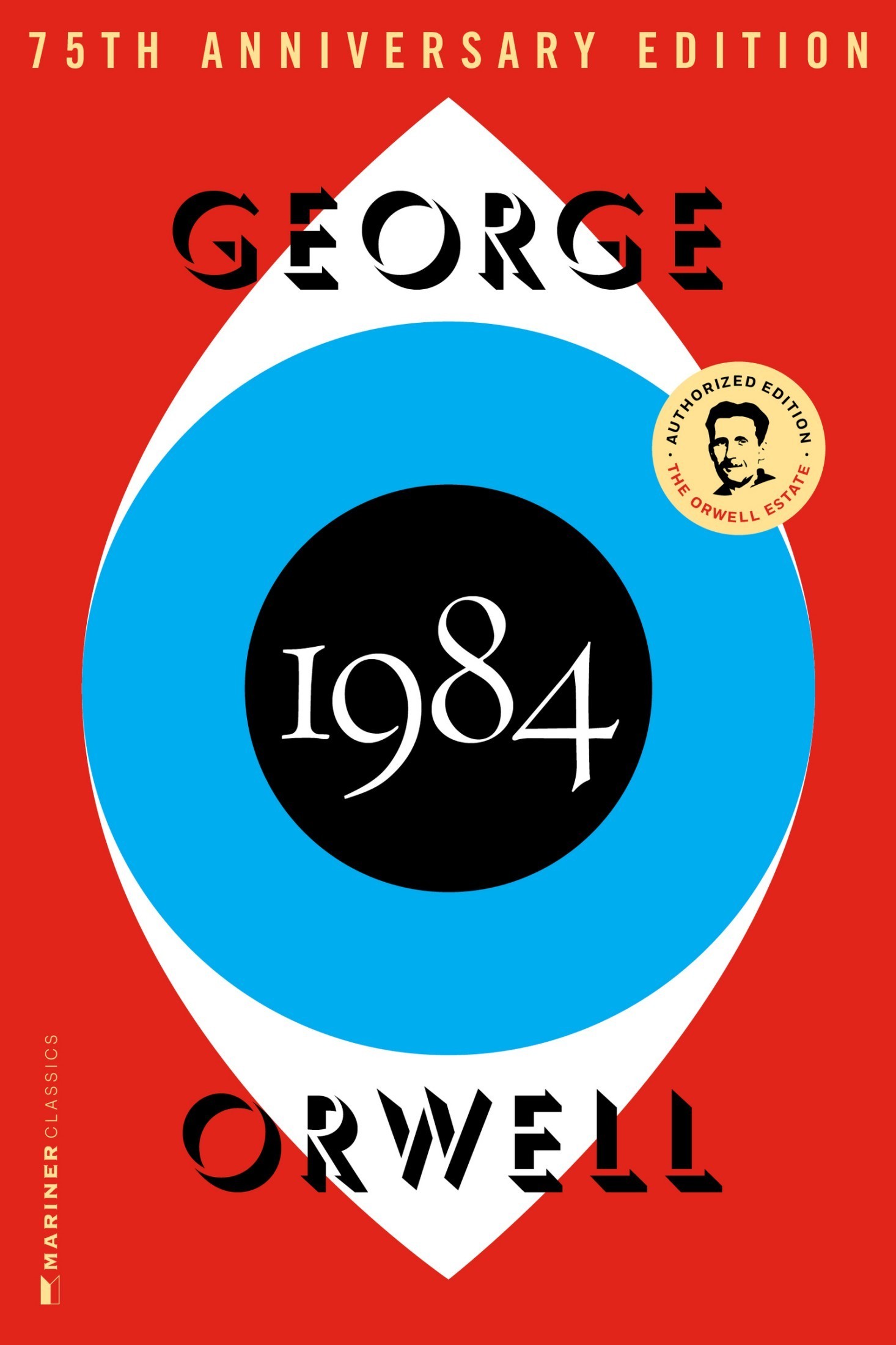1984
„Das ist doch das Buch mit dem totalitären Überwachungsstaat. Big Brother is watching you!“. Wohl eines der bekanntesten Bücher überhaupt, immer wieder wird es genannt, wenn es in einer Diskussion um Überwachung und Datenschutz geht – aber wer hat es denn wirklich gelesen? Bei mir lag die letzte Lektüre wohl Jahrzehnte zurück, vermutlich noch in der Schulzeit. Also habe ich es mir nochmal vorgenommen – und war erstaunt: Ja, natürlich ist die totale Überwachung ein wesentliches Element dieses Buches. Aber eigentlich geht es um viel mehr. Es geht um die Frage: Was kann ein einzelner einem übermächtigen Staat entgegensetzen? Und noch viel mehr darum: Was ist eigentlich Wahrheit?
In diesem Buch ist Winston Smith, ein eher niederes Mitglied der PARTEI, in seinem Beruf ständig damit beschäftigt, die Vergangenheit zu korrigieren, indem alte Zeitungsartikel, Bücher, ja sogar literarische Werke an die aktuelle Situation angepasst werden. Denn: Die Partei hat immer Recht. Und wenn die Wirtschaftsprognose von letztem Jahr nicht stimmte, dann muss sie eben im Nachhinein geändert werden. Und wenn sich Ozeanien, eine der drei Großmächte, neben denen keine anderen Länder mehr existieren, im immerwährenden Krieg auf einmal mit Eurasien verbündet statt mit Ostasien, dann müssen alle Dokumente geändert werden, denn dann war Ozeanien schon immer im Krieg mit Ostasien. Auch Personen, die in Ungnade gefallen sind, müssen vollständig aus der Geschichtsschreibung entfernt werden.
Der Sieger definiert eben die Geschichte. Welche Möglichkeiten hat ein Einzelner schon, das Gegenteil zu beweisen?
Die PARTEI definiert aber nicht nur die Vergangenheit. Sie arbeitet daran, sogar die Möglichkeit von „ketzerischen“ Gedanken auszumerzen. Dazu dient die neue Sprache NEWSPEAK, die bewusst das Repertoire der möglichen Themen einschränkt. Für Themen wie Freiheit, Demokratie, Gerechtigkeit oder auch Religion gibt es schlicht keine Wörter mehr. Alles läuft darauf hinaus, dass die PARTEI immer Recht hat. Und wenn sie sagt, dass 2+2 5 ergibt, dann ist das eben so.
Von den normalen menschlichen Regungen wie Liebe, Zuneigung, Mitmenschlichkeit hält die PARTEI gar nichts, denn sie sind schwer zu kontrollieren und beziehen sich noch dazu auf andere. Liebe, auch körperliche Liebe, wird zielgerichtet zerstört. Kinder werden dazu angestiftet, ihre Eltern zu denunzieren. Jeden Tag gibt es „Zwei Minuten Hass“, eine Veranstaltung, deren Dynamik sich niemand entziehen kann. Und einmal sogar eine ganze „Hasswoche“, in der der Hass auf den Feind sich in Raserei steigert. (Eurasien? Südasien? Es wechselt tatsächlich mitten in der Hass-Ansprache und alle tun so, als wäre es schon immer so gewesen) Sehr eindrücklich für mich in diesem Zusammenhang und mit Blick auf die Themen unserer Zeit: Gleich am Anfang wird ein Kinobesuch beschrieben. Im Film werden Bootsflüchtlinge auf dem Mittelmeer gezeigt, die jedoch nicht gerettet werden, sondern vom Militär brutal abgeschossen und versenkt werden. Das Publikum johlt vor Lachen, als die Menschen, auch Kinder, untergehen.
Winston Smith versucht die Rebellion. Er schreibt heimlich Tagebuch. Er hat eine Liebesaffäre mit Julia, findet einen – wie er meint – nicht überwachten Unterschlupf, in dem sie sich treffen können. Er versucht, sich dem Widerstand anzuschließen. Er bekommt ein Buch des „Rebellenführers“ und Staatsfeindes Emmanuel Goldstein zu lesen, das den Aufbau der Gesellschaft beschreibt: Nur ein kleiner Teil der Menschen gehört überhaupt zu den Parteirängen. Der größte Teil (die „Proles“, etwa 85%) bleibt weitgehend sich selbst überlassen, aber in so großer Armut, dass ein Aufstand nicht zu befürchten ist, denn dafür werden sie niemals die Kraft aufbringen.
Als eines der Probleme der Zeit wird in diesem Buch die Industrialisierung benannt, die die Produktivität der Menschen gewaltig steigerte. Eigentlich wäre absehbar gewesen, dass dadurch auch der Wohlstand aller steigen müsste – was aber die Position der PARTEI gefährden würde. Vor allem aus diesem Grund sind die drei Machtblöcke seit Jahrzehnten im Krieg miteinander: Um die gewissermaßen überschüssige Produktivität sofort wieder zu vernichten und um eine Begründung für den niedrigend Lebensstandard zu liefern.
Auf vielen Seiten wird dieses „Buch im Buch“ abgedruckt, das, wie Winston später erfahren wird, in Wirklichkeit von Parteimitgliedern geschrieben wurde. Und dann beginnt der letzte Teil: Winston und Julia werden verhaftet.
Der letzte Teil ist auch beim Lesen nur schwer zu ertragen. Zarte Gemüter sollten vielleicht besser eine Zusammenfassung lesen. Und wer nicht wissen will, wie es endet, sollte diesen Absatz überspringen und im nächsten weiterlesen. Auf die Verhaftung folgt eine lange Zeit der Folter und Gehirnwäsche mit Phasen der Erholung. Wie lange, ist völlig unklar. Lange wehrt sich Winston dagegen, zieht sich immer mehr in sich selbst zurück, versucht, sich seine Zweifel zu erhalten. Doch am Ende wird auch er gebrochen. Gegen die übermächtige PARTEI hat er keine Chance. Er wird in ein neues Leben entlassen. Aller Lebensmut hat ihn verlassen, doch er existiert. Einmal begegnet er sogar Julia wieder, doch die beiden haben sich nicht wirklich mehr etwas zu sagen. Die Nachrichten der PARTEI sind nun sein Evangelium. Und am Ende wird ihm klar: Er liebt Big Brother.
An die Geschichte angehängt ist eine kurze Abhandlung über NEWSPEAK und über die Rolle, die Sprache bei der Machterhaltung der PARTEI spielt. Darüber, wie immer mehr Begriffe verschwinden, wie das Denken durch Einschränkung der Sprache begrenzt wird. Darüber, wie vieldeutige Begriffe auf eine einzige Bedeutung reduziert werden, so dass es immer schwieriger und am Ende unmöglich wird, etwas auch nur zu denken, das der Parteilinie widerspricht.
Dass man mit Sprache Bewusstsein schaffen und beeinflussen kann, sollte uns allen bewusst sein. In unserer Zeit geht es da um andere Dinge: Das Gendern beispielsweise. Oder der von der afd eingeführte Begriff „Remigration“, der vor wenigen Jahren noch undenkbar gewesen wäre und heute in bestimmten Kreisen völlig selbstverständlich genutzt wird. NEWSPEAK geht einen anderen Weg: Es macht nicht das Unsagbare sagbar, sondern das bisher Sagbare unsagbar. Und doch zeigt es, welche Macht in der Sprache liegt.
George Orwell hat sein Buch 1948 fertiggestellt, daher der Titel mit dem Zahlendreher: 1984. Aus seinen Erfahrungen mit totalitären Systemen heraus hat er diese Dystopie einer völlig unterdrückten und gleichgeschalteten Gesellschaft geschrieben. Ich finde: Auch heute noch ist es wichtig, dieses Buch zu kennen, und zwar nicht nur das Schlagwort „Überwachungsstaat“ und „Big Brother is watching you“.












